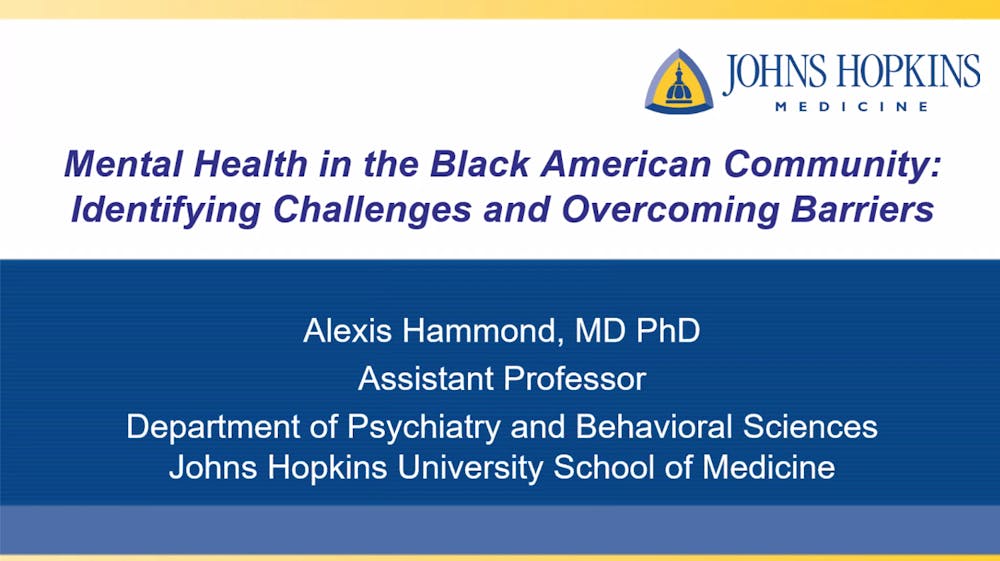The Black Faculty and Staff Association (BFSA) invited Dr. Alexis Hammond, associate medical director at the Center for Addiction and Pregnancy/Addiction Treatment Services, to highlight inequities in healthcare and destigmatize mental illness among the Black community. The BFSA hosted the event on Feb. 18 as part of the organization’s celebration of Black History Month.
Hammond began her presentation by emphasizing that COVID-19 has exacerbated existing mental health issues within the Black community. She noted that studies have found increases in mental health issues in the public, including post-traumatic stress disorder, depression, substance use disorder, domestic violence and child abuse.
“The Black American community has had to deal with certain things that have been there forever, like health disparities,” she said. “There’s also the systemic racism that has been woven into our country that has been very stressful. Racism is very traumatic.”
She explained that Black adults are more likely than white adults to report symptoms of emotional distress, and those living below the poverty line are twice as likely to report psychological distress. Despite this, she reported that only one third of Black Americans are able to receive care that is up to standard based on national guidelines.
“In terms of barriers, we need more Black providers and more culturally competent providers,” she said. “Studies have shown that 66% of Black Americans have seen mental health conditions as a sign of weakness. Having that stigma associated with mental illness can lead to shame and worrying what other people think of them.”
She explained that implicit biases affect the psychiatric care that Black people receive. A study showed that health-care providers are more likely to diagnose Black people with psychotic disorders like schizophrenia instead of mood disorders.
Hammond stressed that medical professionals are taking steps to acknowledge and correct the implicit bias that has prevailed throughout history. For example, her department has started inviting speakers to educate about and raise awareness of this implicit bias.
“We are trying to be more culturally competent, more so than when I was in medical school. In general, we are moving toward focusing on implicit biases and how we can address them, but not every department or hospital has started,” she said. “It’s going to take a long time. Systemic racism is in the fabric of our country.”
In light of this, she remains hopeful that systems of injustice will gradually wear down as the public becomes cognizant of these issues to enact substantial change in society. She recommended that members of the audience have open discussions about mental illness and help loved ones experiencing mental illness navigate barriers.
When asked whether having a Black therapist would be more beneficial than having a non-Black one, she emphasized that it depends on the needs of the patient.
“Black people are not monolithic. Just because you have a Black therapist doesn’t mean you’ll get along with them and they’ll understand you. Having a non-Black therapist who has done their education, is addressing their implicit bias and is open to listening to you is just as important,” she said.
Hopkins offers various mental health resources to its faculty, staff and students, including the mySupport Program, Calm app and Resilience in Stressful Events (RISE) team.
According to Hammond, family members of Hopkins faculty who are living in the same household are eligible for five free mental health sessions through Hopkins. She encouraged her colleagues to utilize these services if necessary.
“Spiritual support is also important. There is a large faith in the Black community,” she said. “It’s okay to pray and ask for treatment. Spiritual care can be part of someone’s mental health support if they’re interested in that.”
Hammond also listed other organizations that are specifically designed to care for the Black community, including the Black Mental Health Alliance, Therapy for Black Girls and Health in Her Hue.
In an interview with The News-Letter, Alisha Sparks, Baltimore Programs Director at the Center for Education at Hopkins, emphasized that it is important for community members to know that these resources are available.
“There is already a stress of being Black every day... Sometimes we’re so used to living the normalcy or burden that we don’t consider the added stress of the pandemic,” she said. “People need to pay attention to themselves and how they’re feeling. If they’re feeling different, they need to reach out for help, while also paying attention to those around them.”

















